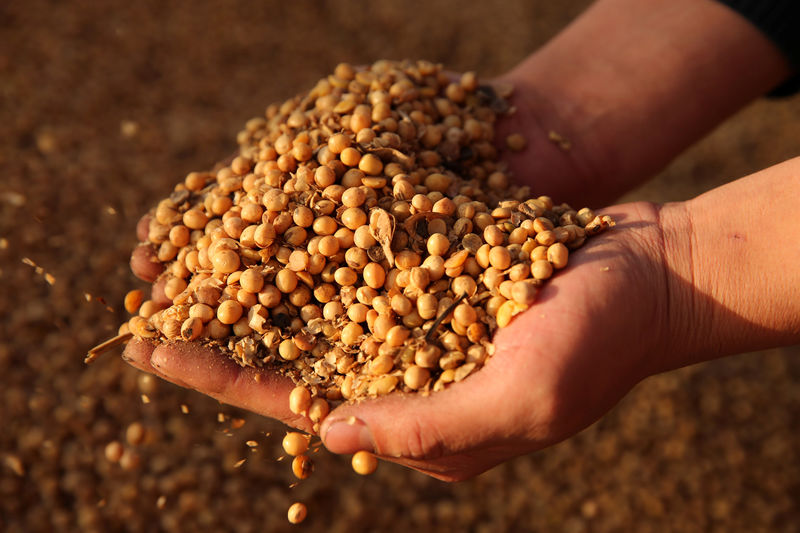By Naveen Thukral and Dominique Patton
SINGAPORE/BEIJING (Reuters) - China's purchases of U.S. soybeans have come to a grinding halt, trade and industry sources say, as fears of further action by Beijing to curb imports of U.S. crops following last week's anti-dumping move on sorghum rattles the agriculture industry.
Buyers from China, which takes 60 percent of soybeans traded worldwide, have not signed any new deals to take U.S. beans in the last two weeks, according to a Reuters review of data published by the United States Department of Agriculture (USDA).
At stake are 3 million tonnes of soybeans - estimated worth about $1.3 billion - for which deals have been signed but cargoes have yet to leave U.S. ports, traders say. Soybeans, crushed to make cooking oil and protein-rich animal feed ingredient soymeal, were the biggest U.S. agriculture export to China last year at a value of $12.3 billion, according to the USDA.
Several ships carrying U.S. sorghum originally bound for China have changed course since Beijing imposed hefty anti-dumping deposits on U.S. imports as trade tensions grow between the world's top two economies.
"After China's action on U.S. sorghum, no one is willing to take the risk of importing beans," said one Singapore-based trader at an international company which owns soybean processing facilities in China.
"As a result the spread between Brazilian and U.S. prices has risen to a level which we have not seen in recent years," he said, declining to be identified because he was not authorized to speak to media.
'WOULDN'T DARE BUY U.S. BEANS'
China's imports of U.S. soybeans fell 27 percent in March compared with the same month a year earlier, customs data showed on Tuesday, while purchases from Brazil jumped by a third.
"We are now buying Brazilian, Canadian and some Argentina beans," said a person familiar with soybean purchasing at a large crusher in China who was not allowed to be identified in media. "We are a state-owned company, we wouldn't dare to buy U.S. beans."
He added that crushers are closely watching talks expected to be held next week between the Chinese and U.S. governments that may decide whether tariffs will be imposed or not.
To be sure, the decline in U.S. bean exports to China is also partly due to seasonal factors. Freshly harvested South American soybeans typically dominate the world trade in the first half of the calendar year, followed by the United States from September onwards.
The United States has also been losing market share in China due to poor quality of crop harvested at the end of last year following unseasonal rains and hurricanes.
"For China, soybeans supplies are food security," said J.Y. Chow, food and agriculture expert at Mizuho Bank in Singapore. "It is going to more of posturing since this is South American supply season and I think there will be pressure to sort it out by July when importers start signing deals for U.S. soybeans."
BRAZIL BONANZA
Red-hot demand for Brazilian beans has driven up prices of South American cargoes, slicing into profits at processing companies in China.
A trader at one international firm in Beijing said Chinese buyers bought more than 40 cargoes of Brazilian beans last week, much higher than a more typical weekly level of 20 to 30. He said crushers as well as large trading companies were seeking Brazilian beans. The trader was not willing to be quoted as he was not authorized to speak to media.
Brazilian soybeans were quoted at $467 a tonne, including cost and freight, to China for June-July shipment, compared with U.S. cargoes priced around $435 a tonne, according to traders in China and Singapore. The usual price spread is around $10 a tonne.
(Graphic - U.S. soybean shipments to China trade at widening discount to Brazil amid trade spat: https://reut.rs/2JqZ9n7)
Brazilian bean prices are rising despite the country estimated by the USDA to harvest a record crop of 115 million tonnes this year.
The impact on bean processing margins is already showing up in data. Crushers in China's eastern province of Shandong, the hub of soybean processing, are now making a profit of just about 21 yuan a tonne

(Graphic - China soy crush margins slump as soybean prices from Brazil climb: https://reut.rs/2Ff6sM7)